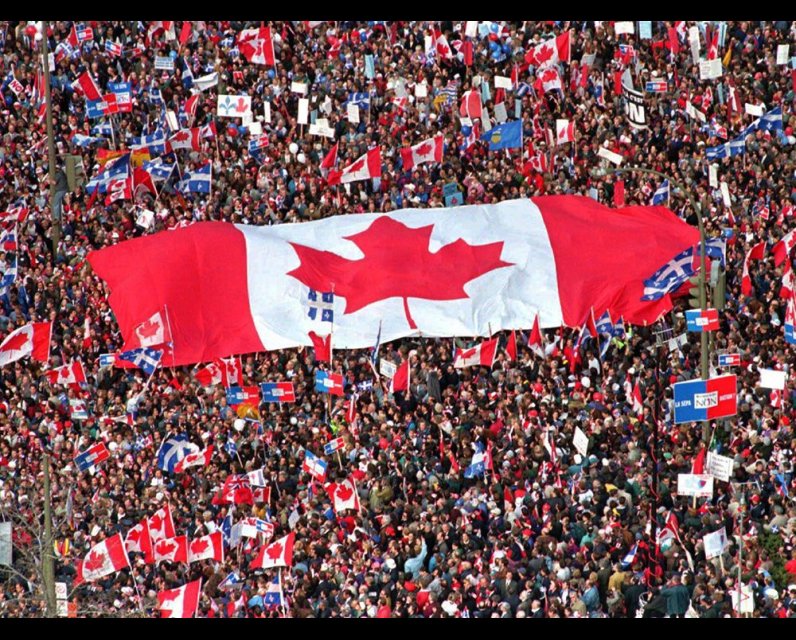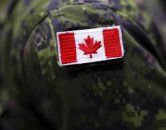30 years after Quebec referendum, majority of Canadians see Canada as one nation: poll

Thirty years after Quebec voted on whether or not to leave Canada and form its own country, Canadians increasingly see themselves as one nation, despite talks of separation by some provincial leaders, according to a new poll.
“It’s nice to say we’re all a multinational federation, but our populace truly refuses to see us that way,” said Jack Jedwab, president and CEO of the Association for Canadian Studies, which commissioned the poll. “Academia that continues to insist Canada is some sort of multinational federation is operating in some sort of parallel place, completely out of tune with the public.”
In 1995, Quebecers voted in a hotly contested referendum on whether to leave Canada. The “remain” side won with a little more than 50 per cent of the vote. Just over 50,000 votes kept Quebec in Canada.
Provinces like Quebec, or even Alberta, have flirted with the idea of separating from Canada as a whole, or gaining a distinct nationhood status within Canada itself. Quebec’s provincial government ran an unsuccessful independence referendum in 1995, losing by just over 50,000 votes. Paul St-Pierre Plamondon, the leader of the Parti Québécois, has promised to hold yet another referendum, if his party forms government in the 2026 provincial election. In Alberta, there are duelling petitions seeking to put a secession question before the populace.
But the data suggest that there is little appetite for separation from Canada. The polling, done by Leger, shows only 28 per cent of Quebecers and 24 per cent of Albertans support the idea of full separation from Canada.
Indeed, Canadians largely see Canada as a single nation, not a collection of nations, including Quebec, English Canada and Indigenous nations. Fifty-two per cent of Canadians see Canada as having only one nation, while 17 per cent believe there is an English nation, a Quebecois nation and an Indigenous nation in Canada. Notably, when the Association for Canadian Studies asked the question three years ago, just 38 per cent of Canadians said there is only one nation in Canada, and eight per cent said there were three nations.
“If you go back historically, we used to have this idea of Canada as sort of bi-national and, increasingly these days, people take that and try to incorporate Indigeneity in the idea of what a nation implies,” said Jedwab.
The view that there is only one Canada is held most strongly in British Columbia, at 63 per cent, followed by Manitoba and Saskatchewan, at 61 per cent, followed by Ontario, at 57 per cent. Among the provinces that believe there are three nations, Quebecers, at 28 per cent, and Albertans, at 21 per cent, are most likely to believe that’s the case. Just four per cent of Atlantic Canadians, 15 per cent of Ontarians, 10 per cent of those in Manitoba and Saskatchewan and 12 per cent of those in B.C. believe there are three nations within Canada.
Additionally, 15 per cent of Canadians believe there are 50 or more nations within Canada — English, French and multiple Indigenous and Métis nations. The view, at 23 per cent, is held most strongly in Quebec, followed by 17 per cent in British Columbia and 15 per cent in the Atlantic provinces. Just seven per cent of those in the Prairies and 13 per cent of those in Ontario believe there are 50 or more nations within Canada.
However, modest numbers of Canadians believe their region can be considered a distinct nation within Canada. Fifty-three per cent of Quebecers believe that, but the numbers fall off dramatically in the rest of the country. Thirty-three per cent of Albertans believe their region can be considered a distinct nation, as do 28 per cent of Atlantic Canadians, 27 per cent of British Columbians, 25 per cent of Ontarians and 22 per cent of those in Manitoba and Saskatchewan. Around one-quarter of Canadians believe their region should have special status within Confederation.
This trend also extends to Indigenous Peoples, at a time when many Indigenous leaders have renewed calls for their respective communities to be recognized as distinct nations. Fifty-five per cent of Indigenous poll respondents said Canada should be considered one nation, while 25 per cent said there are 50 or more nations within Canada — English, French and multiple Indigenous nations.
“It’s important to articulate the message of a country that aims to be inclusive, ensuring that its provinces’ needs are addressed fairly without creating too much inequity between them. I think right now you are seeing a fair bit of confusion about what the vision for the country is,” Jedwab said.
The online poll of 1,627 Canadians was conducted between Aug. 29 and 31, 2025. While no margin of error can be associated with a non-probability sample, a same-size probability sample would have a margin of error of plus or minus 2.52 per cent, 19 times out of 20.
Our website is the place for the latest breaking news, exclusive scoops, longreads and provocative commentary. Please bookmark nationalpost.com and sign up for our daily newsletter, Posted, here.


Comments
Be the first to comment